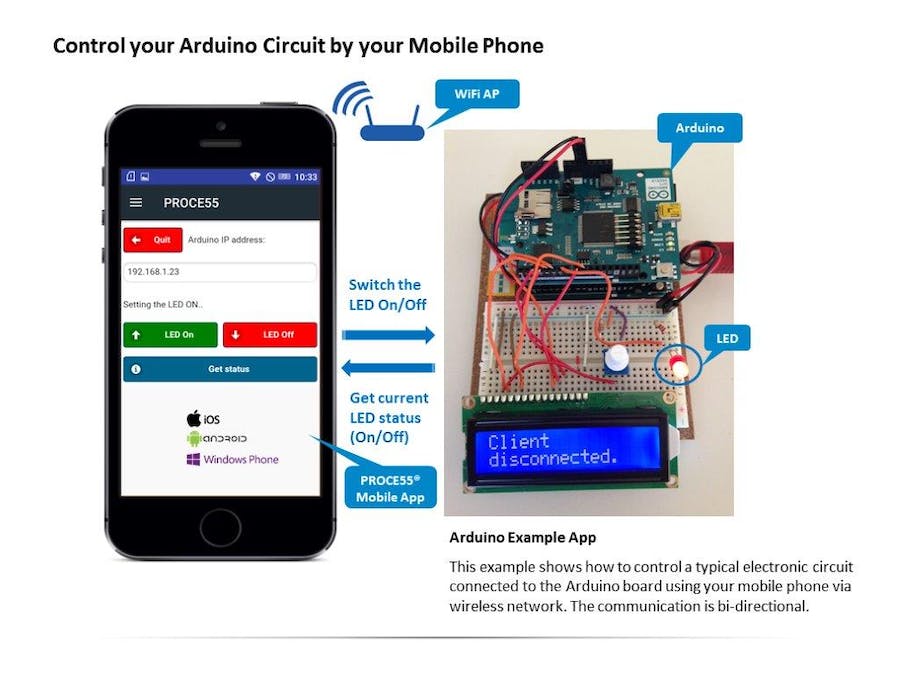
Cómo controlar Arduino desde un teléfono móvil © GPL3+
Control remoto Arduino Uno a través del teléfono móvil.
Componentes y suministros
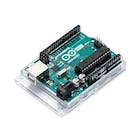 |
|
× | 1 | |||
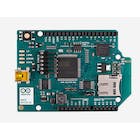 |
|
× | 1 |
Acerca de este proyecto
Cómo controlar Arduino con tu celular
Hola, encontré una manera fácil y cómoda de controlar mi Arduino con un teléfono móvil.
La base de este proyecto es Arduino Uno con un escudo WIFI y un punto de acceso WIFI para tener la posibilidad de controlar la tarjeta inalámbrica desde el teléfono.
Todo el proceso se representa en la secuencia de imágenes a continuación:
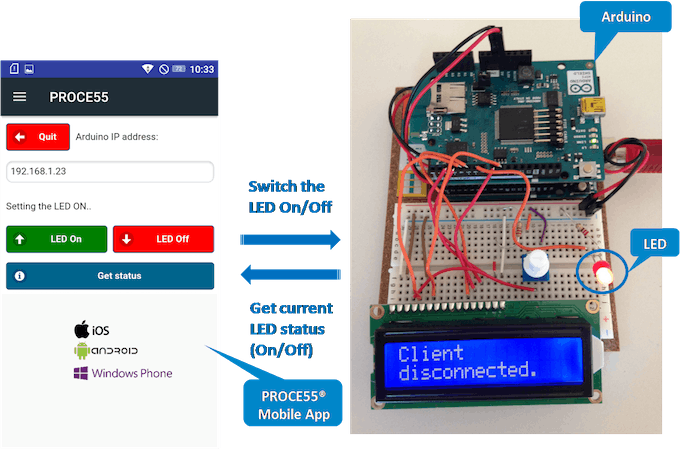
Aplicación Arduino Control: Cómo instalar
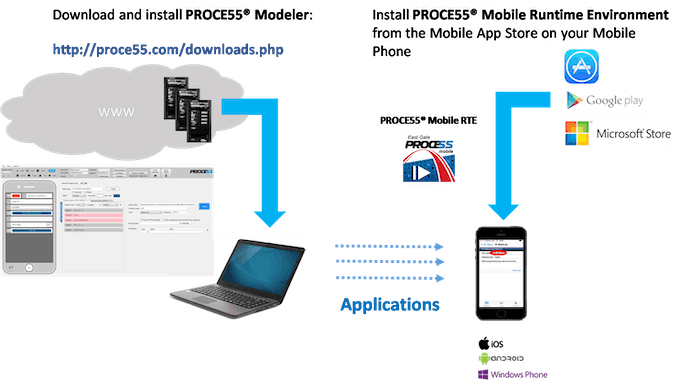

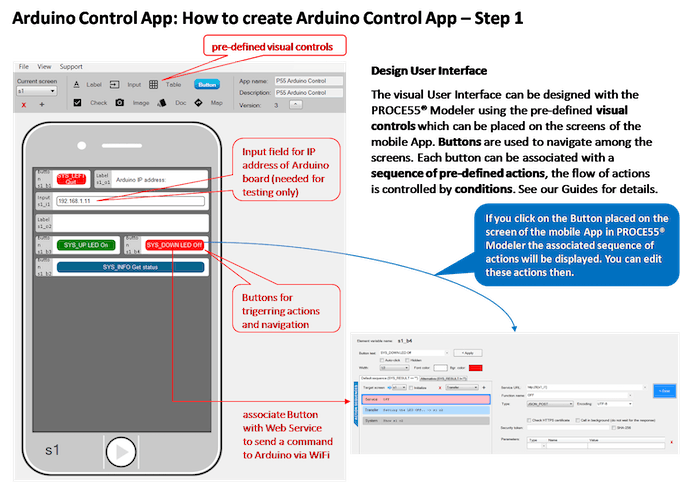
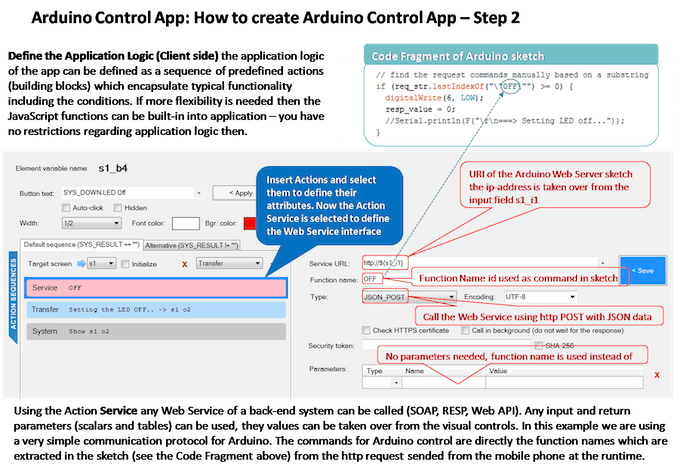
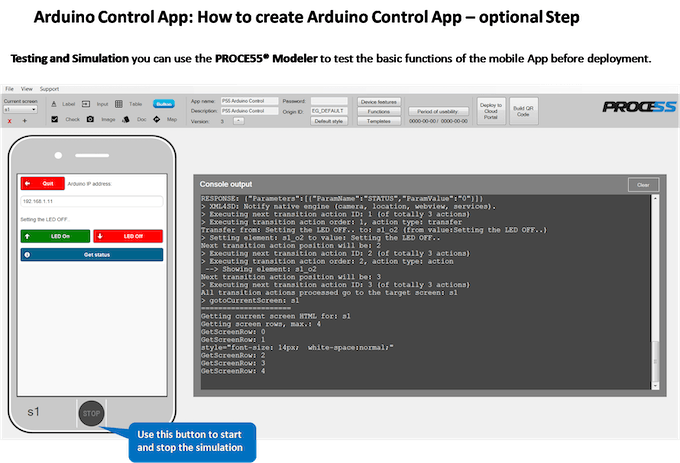
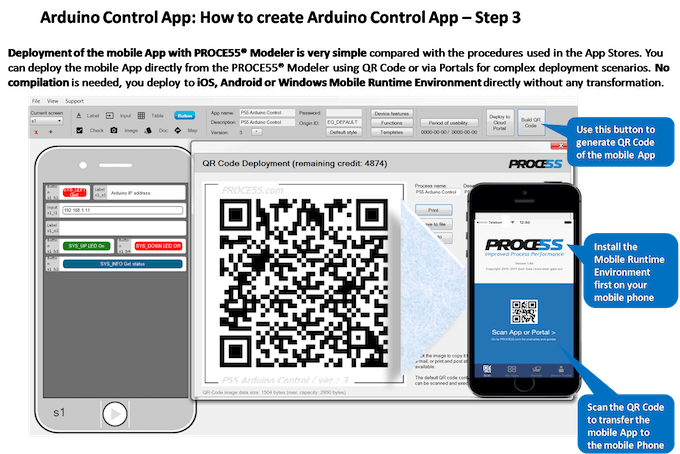
¡Disfrutar!
codificado
- Servidor web para Arduino
Servidor web para Arduinoarduino
Cuando descargue y compile este archivo en su placa Arduino, servirá como un servidor web portátil para controlar la placa de forma remota.
/*
PROCE55 WiFi Server Example with JSON request parser
*/
#include <SPI.h>
#include <WiFi.h>
#include <LiquidCrystal.h>
char ssid[] = "P55"; // your network SSID (name)
char pass[] = "PROCE55mobile"; // your network password
//char ssid[] = "EG1"; // your network SSID (name)
//char pass[] = "XML4SDXML4SD1"; // your network password
//char ssid[] = "Tech_D0047758"; // your network SSID (name)
//char pass[] = "WBTJZXJU"; // your network password
// int keyIndex = 0; // your network key Index number (needed only for WEP)
IPAddress ip(192, 168, 0, 90); // static IP for WiFi shield if needed
int status = WL_IDLE_STATUS;
WiFiServer server(80); // Listen on tcp port 80
// initialize the library with the numbers of the interface pins
// LiquidCrystal lcd(12, 11, 5, 4, 3, 2);
LiquidCrystal lcd(4, 9, 5, 8, 3, 2); // 13 instead of 4 (4,7,10,11 and 12 used by Wifi Shield)
void setup() {
//Serial.begin(9600); // initialize serial communication - comment out for better perfomance
//while (!Serial) {
// wait serial port initialization
//}
//pinMode(10, OUTPUT); // HDG204 WiFi deactivate SD card pin 10, if necessary
//digitalWrite(10, HIGH);
// Turn of the LED by default
pinMode(6, OUTPUT);
digitalWrite(6, LOW);
//pinMode(LED_BUILTIN, OUTPUT);
//digitalWrite(LED_BUILTIN, LOW);
// Init the LCD 16x2
lcd.begin(16, 2);
lcd.clear();
// check for the presence of the shield:
if (WiFi.status() == WL_NO_SHIELD) {
//Serial.println("WiFi shield not present");
lcd.clear();
lcd.setCursor(0, 1);
lcd.print(F("Error: no wifi!"));
while (true); // don't continue
}
/*
if (WiFi.firmwareVersion() != "1.1.0") {
Serial.println(F("Please upgrade the WiFi Shield firmware!"));
lcd.clear();
lcd.setCursor(0, 1);
lcd.print(F("Firmware old!"));
}
*/
// attempt to connect to Wifi network:
lcd.clear();
lcd.setCursor(0, 0);
lcd.print(F("Initializing..."));
lcd.setCursor(0, 1);
lcd.print(F("SSID:"));
lcd.setCursor(5, 1);
lcd.print(ssid);
// Comment the WiFi.config if static setup not needed, DHCP applies then
//WiFi.config(ip); // WiFi.config(ip, dns, gateway, subnet);
while (status != WL_CONNECTED) {
//Serial.print(F("Attempting to connect to WLAN SSID: "));
//Serial.println(ssid); // print the network name (SSID);
status = WiFi.begin(ssid, pass);
// wait 6 seconds for connection:
delay(6000);
}
server.begin(); // start the web server on port 80
lcd.clear();
lcd.setCursor(0, 0);
lcd.print("Ready");
printWifiStatus();
}
void loop() {
WiFiClient client = server.available(); // listen for incoming clients
if (client) {
//Serial.print(F("Client connected"));
String req_str = "";
String currentLine = "";
int data_length = 0;
int data_read_length = 0;
boolean skip = true; // Skip first CRLF in request header
int response_length = 0; // HTTP response Content-Length
int resp_value = -1; // LED status
lcd.clear(); lcd.setCursor(0, 0); lcd.print(F("Client")); lcd.setCursor(0, 1); lcd.print(F("connected"));
while (client.connected())
{
if (client.available()) {
char c = client.read();
//Serial.write(c);
if (data_length > data_read_length && !skip) {
// Read remaining request body data
req_str += c;
data_read_length++;
//Serial.println(data_read_length);
}
if (data_length <= data_read_length && !skip) { // c == '\n' &&
// Request read completed, send response
// find the request commands manually based on a substring
if (req_str.lastIndexOf("\"OFF\"") >= 0) {
digitalWrite(6, LOW);
resp_value = 0;
//Serial.println(F("\r\n===> Setting LED off..."));
}
else if (req_str.lastIndexOf("\"ON\"") >= 0) {
digitalWrite(6, HIGH);
resp_value = 1;
//Serial.println(F("\r\n===> Setting LED on..."));
}
else {
// GET
if (digitalRead(6) == 1) {
resp_value = 1; // HIGH
}
else {
resp_value = 0; // LOW
}
}
// Send the response
//Serial.println(F("===> Request read completed, sending response..."));
response_length = 56; // = 51 + 1 + 4;
client.write("HTTP/1.1 200 OK\r\n");
client.write("Content-Length: ");
client.print(response_length); // sizeof(resp)
client.write("\r\n");
client.write("Connection: close\r\n");
client.write("Access-Control-Allow-Origin: *\r\n");
client.write("Content-type: application/json; charset=utf-8\r\n");
client.write("\r\n");
client.write("{\"Parameters\":[{\"ParamName\":\"STATUS\",\"ParamValue\":\""); // 51 characters
client.print(resp_value); // 1 character
client.write("\"}]}"); // 4 characters
client.write("\r\n");
break;
}
else if (c == '\n' && currentLine.length() == 0 && skip) {
// Start of the request body after this line
//Serial.println(F("===> Start of the request body."));
skip = false;
}
else if (c == '\n' && currentLine.length() > 15 && currentLine.startsWith(F("Content-Length:")) && skip) {
//skip = false;
//String temp = currentLine.substring(15);
//temp.trim();
//Serial.print(F("===> Content length detected: "));
//data_length = temp.toInt();
data_length = currentLine.substring(15).toInt();
//Serial.println("Content-length: ");
//Serial.println(data_length);
}
if (c == '\n') {
// new line
currentLine = "";
} else if (c != '\r') {
// add current character to the current line
currentLine += c;
}
} // if data available
} // client still connected
// give the client time to receive the data
delay(50);
// close the connection:
client.stop();
//Serial.println(F("===> Client disconnected."));
printWifiStatus();
}
}
/*
POST / HTTP/1.1
Content-Length: 328
Content-Type: application/json
{"FunctionName":"TEST","Status":"","StatusText":"","TextEncoding":"","SecurityToken":"","Parameters":[{"ParamName":"function_name","ParamValue":"TEST"},{"ParamName":"requestencoding","ParamValue":"UTF-8"},{"ParamName":"responseencoding","ParamValue":"UTF-8"},{"ParamName":"PARAM1","ParamValue":"Test passed!"}],"TableValues":[]}
*/
void printWifiStatus() {
// print the SSID of the network you're attached to:
Serial.print(F("SSID: "));
Serial.println(WiFi.SSID());
// print your WiFi shield's IP address:
IPAddress ip = WiFi.localIP();
Serial.print(F("IP Address: "));
Serial.println(ip);
// Status to LCD
lcd.clear();
lcd.setCursor(0, 0);
lcd.print(WiFi.SSID());
lcd.setCursor(0, 1);
lcd.print(IpAddress2String(ip));
// print the received signal strength:
Serial.print(F("Signal strength (RSSI):"));
Serial.print(WiFi.RSSI());
Serial.println(F(" dBm"));
// print where to go in a browser:
Serial.print(F("Send your HTTP requests to http://"));
Serial.println(ip);
return;
}
String IpAddress2String(const IPAddress& ipAddress)
{
return String(ipAddress[0]) + String(".") +\
String(ipAddress[1]) + String(".") +\
String(ipAddress[2]) + String(".") +\
String(ipAddress[3]) ;
}
diagramas
Ejemplo de circuito
Descargar


Por favor inicie sesión o regístrese para comentar.